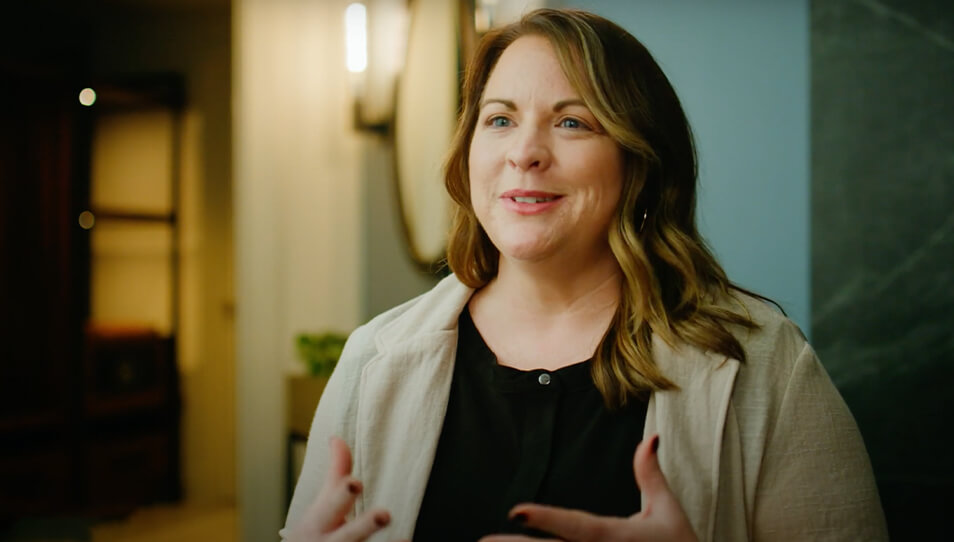Interwell’s Four-Point Approach to Better Kidney Care at Lower Cost
Patient focused, nephrologist-led, and data driven. With the reach and scale to provide care in all 50 states.
tags

Value-based kidney care reimagines healthcare delivery to focus on quality and outcomes for individuals and whole populations. The goal is to keep people healthy while managing rising healthcare costs.
Interwell Health is driving this transformation by leveraging a proven model that combines comprehensive care, predictive analytics, and scale to meet the needs of kidney patients and the stakeholders who care for them.
Our approach has achieved remarkable clinical results for patients in 2022, including an optimal start rate that is 154 percent above the national average and almost 20 percent fewer all-cause hospitalizations. In addition to improving patient health, these outcomes lead to significant cost savings for payers.
You’ll hear from everyone that the patient’s at the center of the care model. –Jessica Demaline, Senior vice president of healthcare operations
“We understand how to empower patients with education, support, and interventions so they can be healthier, which then lowers the cost of care for the healthcare system," explained Jessica Demaline, Interwell's senior vice president of healthcare operations.
Here are four pillars that distinguish our approach.
1. Patient-focused
As a social worker and executive with over a decade of experience in nephrology, Demaline knows just how overwhelming a kidney disease diagnosis can be. “Many patients expect or envision the worst,” she said. Interwell’s care model empowers patients through education and support.
“When you go to a doctor’s office, they might not have the time to educate you. We have that time,” Demaline said. “We can talk with a patient on the telephone. We can sit with them in the physician's office. We can mail them materials and then call them a week or two later and say, ‘Hey, what did you think about that? Do we need to go a little bit deeper on any of the materials?’”
A care team also supports patients along the way. “There’s a holistic team caring for the patient's whole self. That team includes coordinators who help with things like scheduling appointments, providing transportation to patients, and connecting patients to community resources, as well as a team of clinicians who include nurses, social workers, dietitians, pharmacists, and advanced practice practitioners.”
2. Nephrologist-led
Interwell gives nephrologists the tools and resources they need to shift to value-based care successfully. Our practice resources, education suite, and nephrology-specific electronic health record technology make patient care and coordination as efficient – and effective – as possible.
“We also put the nephrologist, who is really the one directing the patient’s care, at the center,” Demaline explained. “We collaborate closely with the nephrologist. We’re either in their office working with them or working with them telephonically or virtually to make sure we are helping them coordinate their patient’s care.”
3. Data-driven
Interwell’s data platform equips nephrologists and clinicians with the information they need to coordinate patient care. The company uses risk and predictive analytics to identify the progression of a patient's kidney disease and the likelihood of hospitalization.
“We can predict a patient’s risk of hospitalizations in the next seven days,” Demaline said. “We also use predictive analytics to identify a patient's risk of progression to end stage kidney disease (ESKD). This allows us to identify – and provide – the right interventions at the right time, for the right group of patients. For a patient progressing slowly, we might focus on managing comorbidities and try to delay that progression. For a patient progressing quickly, we can focus on dialysis modality education, access placement, and transplant coordination.”
4. Unprecedented scale
Our clinical care model is amplified by the unrivaled scale of our network. Interwell now covers 125,000 lives and manages more than $7 billion in total medical costs. Our nephrology network has grown to over 1,800 providers, and we’re aligned with more than 2,600 dialysis centers across the country.
“We have a presence pretty much everywhere,” Demaline explained. “We have the scale to provide care for patients in all 50 states."